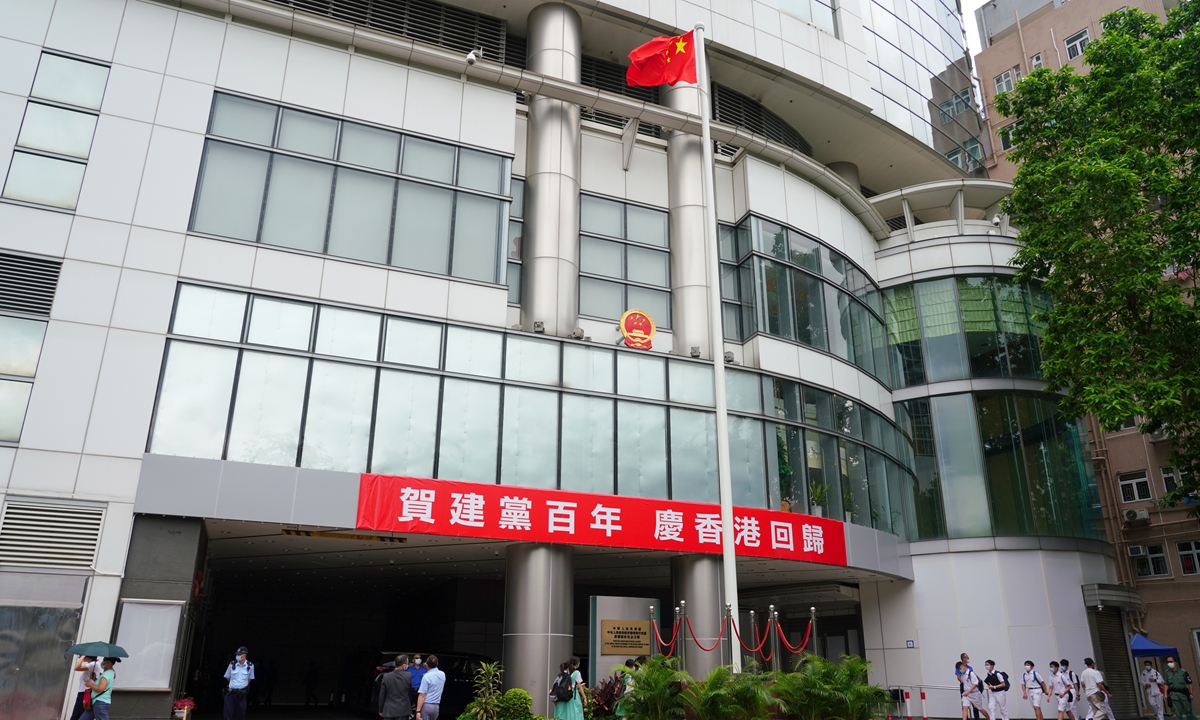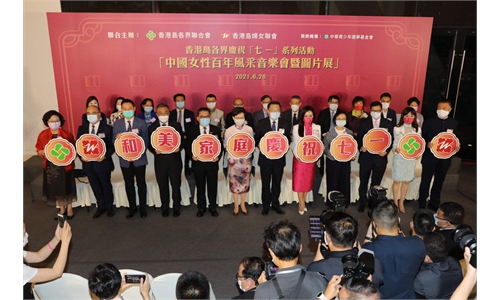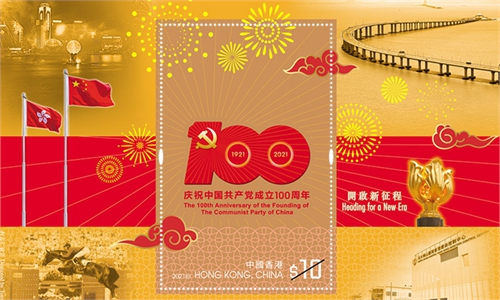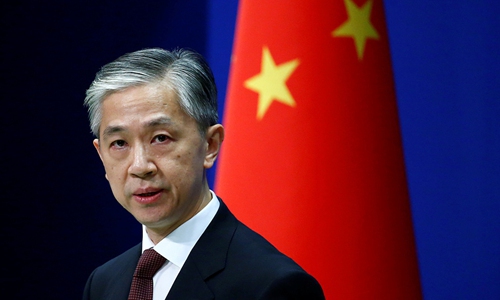One year on, national security law for HK brings hope, restores order, recovers businesses

Passers-by look at a banner celebrating the centennial of the Communist Party of China and the 24th anniversary of Hong Kong's return to the motherland above the entrance to the office for safeguarding national security of the central government in the Hong Kong Special Administrative Region on Wednesday. Photo: cnsphoto
One year since the national security law for Hong Kong took effect, many people said the city is totally different now.
For residents in Hong Kong, it would be a hard thing to do to recall those days during the summer two years ago, when they were afraid to take the subway as black-clad rioters may attack commuters randomly just because they spoke Putonghua, and they could not go shopping during the weekends as the downtown city, shopping centers and major tourists sites had been occupied by the radical protesters for vandalism, setting fires and provoking violent confrontation with the police. Riots had turned this global financial hub into a "war zone" when the violence gripped the city.
At that time, the prospects of this "pearl of the orient" became so gloomy for many Hong Kong residents amid an endless political movement that then turned into a kind of "color revolution" instigated by external anti-China forces.
The highly anticipated national security law for Hong Kong, which took effect on June 30, 2020 has had a powerful deterrent effect on foreign forces involved in meddling in Hong Kong affairs over the past years. The law has become a guardian for the city's stability and peace, and the central government's office for safeguarding national security in Hong Kong is hailed as a "gatekeeper of national security."
No matter how hard the Western media, scholars and nongovernmental organizations (NGOs) have tried to smear the national security law for Hong Kong and to distort its role and intention - for example, Amnesty International issued a report on Wednesday at the first anniversary of the enactment of the law by calling it a "human rights emergency," the New York Times described the changes in the city as a process of "a form of brainwashing" and CNN insisted on calling the law "controversial," describing it as a tool to crack down on individual freedoms - more than half of Hong Kong residents see their freedom and personal interests are kept intact since the enactment of the law. Instead, some said as a safe Hong Kong has come back, they felt thrilled and joyful to celebrate three important anniversaries at the same time.
This week, as Hong Kong is celebrating the 24th anniversary of its return to the motherland, the 100th anniversary of the founding of the Communist Party of China (CPC) and the first anniversary of the implementation of the national security law for Hong Kong, the festive atmosphere across the city appeared to be unprecedented. Buses and trams are getting in on the festivities, with many decorated with red designs featuring elements related to the CPC, and over 200 Chinese national flags and flags of the Hong Kong Special Administrative Region are displayed in Tsim Sha Tsui. Hong Kong Post also plans to issue a set of commemorative stamps, a stamp sheet and other philatelic pieces to mark the CPC's centennial on July 1, while a number of seminars, exhibitions and cultural activities were held to discuss why it's important to enhance national security awareness and carry on the relevant education in local communities and schools.
A city with numerous positive changes gave new hope to local officials, residents and businesses.

Infographic:GT
A new life
Some local officials said they could not image, if not for the firm support from the central government by imposing the national security law for Hong Kong, how the city would overcome multiple challenges including the black-clad rioters from 2019 to early 2020, the COVID-19 outbreak and the continuing social turmoil.
Over the past year, local residents have seen their daily life back to normal, and both the national security law for Hong Kong and electoral reform guarantee the city a promising future, clearing obstacles in local systems while enabling policymakers to focus on working on the local economy and livelihood, instead of being entangled in a reckless political movement, some officials said.
Like many people say, the national security law serves as a pillar of the city's stability. Without it, we would not be able to control the epidemic, Carrie Lam, chief executive of the HKSAR government, was quoted as saying in media reports on Wednesday.
Under the impact of the black-clad riots and epidemic, the LegCo entered into a chaotic situation, and the decision made by the top authority helped solve a major problem for Hong Kong, Lam said.
Since the implementation of the law, some major secessionists and leaders of radical anti-government groups such as Jimmy Lai, Joshua Wong, and Benny Tai have been arrested on suspicion of colluding with foreign forces and endangering the national security, signaling a significant deterrence, which also reshaped the landscape of local political life in Hong Kong, observers said.
Under the national security law for Hong Kong and the electoral reform, anti-China rioters in Hong Kong have no room to survive and they could not take part in local governance. Until now, major anti-China figures have been cleared out, and there won't be any large-scale opposition like before, Lau Siu-kai, vice head of the Chinese Association of Hong Kong and Macao Studies, told the Global Times on Wednesday.
"The city's political life has entered a new phase. The future governance will surely be combined with both governance of the central government over Hong Kong and high autonomy of the HKSAR government," Lau said.
Since the national security law took effect, 117 people had been arrested as of Tuesday for behavior or activities suspected of endangering national security, the Hong Kong Police Force told the Global Times on Wednesday via email.
As the city returns to normal, it is reassuring for local small merchants like Li, a grocery store owner, whose business was heavily hit by the social turmoil in 2019.
Instead of holding fear that his store, located near the police station in Mong Kok, could be shut down any minute due to the riots, Li has now become optimistic toward future business despite the impact of the epidemic.
Despite the disruptions from the COVID-19, the Hong Kong economy ended six consecutive quarters of contraction in the first quarter of 2021, recording a 7.9 percent year-on-year growth. Retail sales maintained notable growth in April, up 12.1 percent from a year ago, data from the Census and Statistics Department of the HKSAR government showed.
Some Western media and think tanks have hyped that the foreign funds would retreat from the Hong Kong market.
A Hong Kong-based banker, who gave his name as Jeff, told the Global Times that there has been no so-called retreat in investment among mainstream international banks, major regional banks and large foreign investment banks since the enactment of the national security law.
"They not only stay but also want their future development more integrated into the SAR, which holds an important status in the construction of the Guangdong-Hong Kong-Macao Greater Bay Area," said Jeff.
Future path
Over the past two years, the central government's approach toward Hong Kong has undergone significant changes. Under the interference of internal and external forces, Hong Kong seemed to have alienated from the central government, and had seriously deviated from the right track of the "one country, two systems," according to some Hong Kong observers.
As a result, the central government must make adjustments different from the tolerant policies adopted before in order to strike secessionist forces from in and out, sending out strong signals of more decisive measures on Hong Kong affairs, carrying out reforms in Hong Kong's judicial system, and building patriotic forces in the region, Lau noted.
"With radical opposition forces having been largely slashed out, all abovementioned measures have not triggered many objections, and local residents gave little sympathy to these opposition forces. This means Hong Kong has gradually accepted the new political reality," he said.
Though almost no massive black-clad riots led by radical anti-China forces could be seen today, local officials said it's not the time to lower the guard, considering the national security education as a long-term task, and it's time to foster a correct understanding of the CPC, the world's largest ruling party that took a grand journey of transforming a weak and war-torn nation into a global power.
"Many external forces are still waiting for opportunities to sabotage, especially many Western countries, worrying that China has grown into a powerful nation, intent on attacking our country. So we need to enhance our intelligence as well as public education on the national security," Hong Kong Secretary for Security John Lee Ka-chiu was quoted as saying in media reports on Wednesday.
Fan Anqi also contributed to the story





